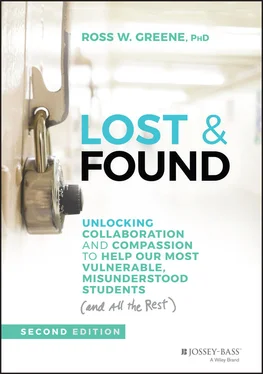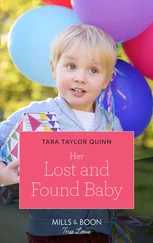1 Verbal aggression (e.g., profane language, teasing other students)
2 Physical aggression (e.g., hitting, pushing, or shoving other students)
3 Dysregulated body movements (e.g., waving hands around, thrashing body, swinging back pack)
Function of Maladaptive Behaviors:
These maladaptive behaviors communicate that TJ is having difficulty meeting specific expectations, as described below. These expectations -- as documented by the Assessment of Lagging Skills and Unsolved Problems (ALSUP) -- are listed below.
Lagging Skills Contributing to TJ's Difficulties:
The ALSUP was completed in a meeting involving TJ's teachers and specialists. They felt that the following lagging skills applied to TJ:
Difficulty handling transitions, shifting from one mindset or task to another
Difficulty doing things in a logical sequence or prescribed order
Difficulty persisting on challenging or tedious tasks
Poor sense of time
Difficulty maintaining focus
Difficulty managing emotional response to frustration so as to think rationally
Difficulty “seeing the grays”/concrete, literal, black-and-white thinking
Difficulty taking into account situational factors that would suggest the need to adjust a plan of action
Difficulty attending to or accurately interpreting social cues/poor perception of social nuances
Difficulty appreciating how his/her behavior is affecting others
Unsolved problems precipitating challenging behaviors:
The following unsolved problems (unmet expectations) were identified during the same ALSUP meeting:
Difficulty moving from one classroom activity to the next:
Biology to geometry
Geometry to meeting with the school counselor
Coming in from PE for English Literature
Coming back from lunch to getting started on World War II project in Social Studies
Difficulty completing writing tasks, including:
The World War II project in Social Studies
The Shakespeare composition in English Literature
The answers to the geometry problems in math
Difficulty working with a partner, including:
Completing the lab report in Biology
Preparing the class presentation on the World War II project in Social Studies with his partners
Difficulty remaining seated:
While listening to an article that was being read aloud in Biology
While writing a short summary of the article during on assigned mat during morning meeting
Difficulty keeping hands to self when standing in line for:
Lunch
PE
School bus
Difficulty completing review sheets for homework in Biology
Difficulty getting along with Trevor and Justin during PE
These problems impede positive school functioning because:
1 TJ is unable to develop positive relationships with other students in his classroom and school community and is struggling to learn appropriate social interactions and norms.
2 This affects TJ's ability to stay regulated in class and limits his access to instruction as well as affects his ability to successfully work in groups with peers.
3 TJ's body movements distract him and his classmates and prevent him from getting the most out of instruction.
4 TJ gets sent to the office and consequently loses instructional time, thus missing out on valuable opportunities to acquire new skills and abilities.
Prior Plan B Problem-Solving Discussions:
TJ was engaged in several Plan B problem-solving conversations prior to the writing of this FBA for the purpose of gathering preliminary information about some of the unsolved problems delineated above. He identified several factors making it difficult for him to complete the World War II project in Social Studies, including the fact that writing tasks have always been difficult for him and that no mutually satisfactory solution has ever been reached to help him with this problem. As regards his difficulty getting along with Trevor and Justin during PE, he indicated that these classmates have been treating him poorly since elementary school, and that this problem has never been addressed satisfactorily.
Team estimate of need for behavior support plan:
| extreme |
serious |
√ moderate |
needing attention, early stage intervention |
Factors maintaining problem behaviors:
1 For social interactions with male peers:TJ is ignored by his male friends when they do not want to interact with him and receives attention from peers when he is physically or verbally aggressive, reinforcing his negative behaviors.TJ does not have social skills strategies to talk through and figure out how to get what he wants from his peers.TJ does not have distress tolerance skills to handle not being included by his male peers.TJ does not have the ability to handle his heightened emotions so as to think clearly regarding alternative options once he feels he has been rejected.
2 For proprioceptive physical feedbackTJ does not have a place (in or outside the classroom) where he can go to move his body when he feels the need for such stimulation.TJ does not have tools (in or outside the classroom) to identify when he needs proprioceptive stimulation that is less disruptive to classroom functioning, or to effectively communicate when he needs to remove himself from class if the need is over.
3 For academic tasksTJ continues to experience significant frustration on specific tasks involving writing, and this problem has been a source of frustration for him for many years…yet the problem remains unsolved.
Goals/Objectives of FBA:
1 Through Plan B problem-solving discussions, help TJ resolve the problems delineated above.
Teaching strategies and necessary curriculum or materials for high priority unsolved problems:
Goal 1 (Social Interactions)
Through Plan B problem-solving conversations (individually and with the two male peers), help TJ and his peers process concerns and work toward solutions that will address the difficulties TJ and the two peers are having in interacting adaptively.
Through Plan B problem-solving discussions, help identify the factors that are making it difficult for TJ to join interactions and maintain positive relationships with peers (e.g., when to approach others; what kinds of cues indicate he is welcome or not; ways to check for clarity regarding if he has or hasn't been rejected).
Goal 2 (Sensory Issues)
Through Plan B problem-solving discussions, help TJ identify conditions in which he feels the need for motion or sensory stimulation and work toward solutions aimed at helping address and communicate about these needs.
Goal 3 (Academic)
Through Plan B problem-solving discussions, determine the factors that are making it difficult for TJ to complete specific writing assignments, and collaboratively determine solutions for addressing these factors.
By whom? Teacher, classroom staff, support staff How frequently? Daily/weekly
Environmental structure and supports to be provided (Time/Space/Materials/Interactions)
Time:
Access materials that he can use to meet need for proprioceptive physical feedback (rough paper on his desk, a fidget, a squeezy ball, etc.).
Calming breaks as needed
Materials:
Plan B
Fidgets, etc.
Chart to memorialize solutions and agreements
Interactions:
The vast majority of interventions -- particularly Plan B discussions -- should occur proactively rather than emergently. However, should TJ become dysregulated over an unsolved problem, the following recommendations should be applied:Determine whether the expectation prompting the dysregulation was supposed to have been removed (Plan C) … if so, let TJ know that the expectation was placed upon him in error.Determine whether a solution is already in place for the unsolved problem and whether it simply isn't working; if so, let TJ know that it would be best to engage him in a Plan B discussion as soon as possible so as to revisit the problem.Use a calm, positive tone and reassure TJ that the problem can be solved.Use additional de-escalation strategies as necessary to ensure TJ's safety and that of other students.
Читать дальше












